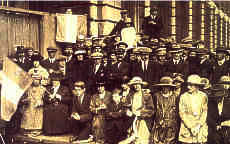
Prayer vigil outside prison
during the Civil War
National Photographic Archive, Hogan Collection
Women were active in attempting to heal the rifts in the republican movement but all efforts failed and the country was sliding into civil war by June 1922. Majority support for the Treaty was reflected in a decline in membership of Cumann na mBan. As moderate members dropped out, it became a more hard-line republican organisation and was much criticised and harassed.
The Irregulars occupying the Four Courts and other buildings in Dublin were supplied with food and information by women. In the guerilla warfare that started up again, mainly in the southern counties, remaining members of Cumann na mBan took part as they had done in the Anglo-Irish War. But it was no longer a case of Irish nationalists united in opposition to an outside force. Protecting men 'on the run' and finding 'safe houses' were less easy now in rural networks and people with Republican sympathies were more easily identified.
This time, hundreds of women were imprisoned, hundreds more demonstrated on the streets and Charlotte Despard and Maud Gonne McBride organised a Women's Prisoners' Defence League (WPDL) to protest against the appalling conditions for women in jail.
The weapon of hunger strike had been employed first in England by the suffragettes in 1909 and subsequently in Ireland by Thomas Ashe in 1917 and by Terence Mac Swiney in 1920. It was now used to obtain publicity and put pressure on the Irish Free State Government.
| As had happened in 1916 and during the Anglo-Irish War, women received some degree of special treatment during the Civil War. No women were executed by the Irish Free State, even those arrested in possession of guns, whereas 77 men were executed. On the other hand, Cumann na mBan were not consulted in the cease-fire negotiations that ended the Civil War. They were still seen as auxiliaries to the men. |
|